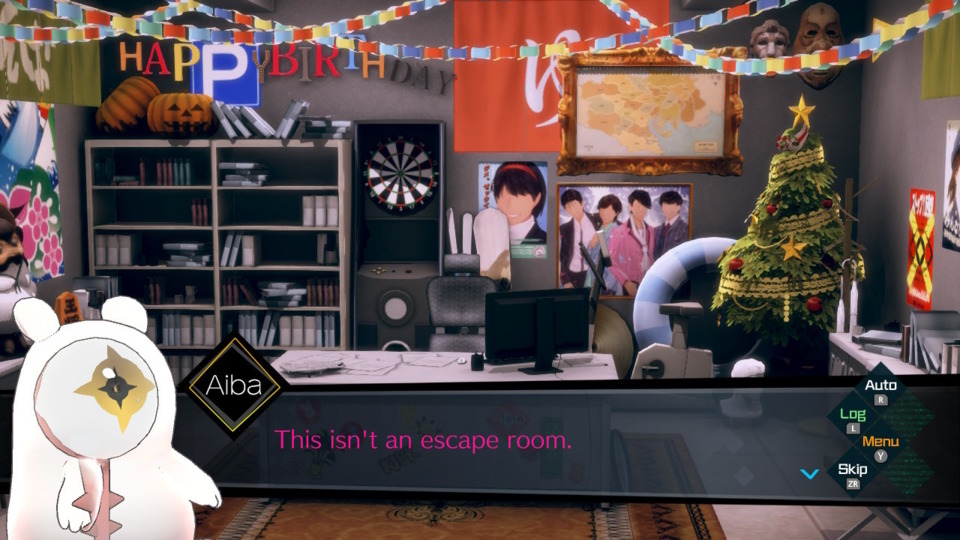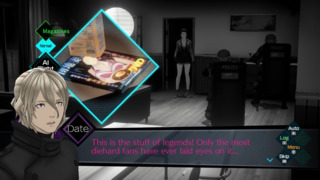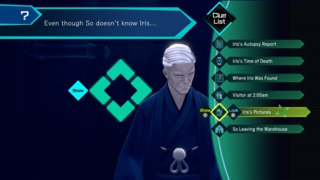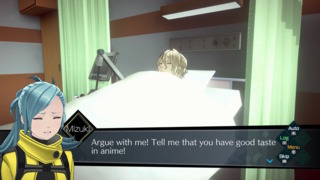Thoughts on AI: The Somnium Files
By Bowl-of-Lentils 6 Comments
**I wrote this shortly after finishing AI: The Sonmium Files but never got around to posting it. Now that we are at the end of the year, I thought I’d polish it a bit and finally upload it. As I say in the write up, I actually do like this game but this post is more about me venting about my issues with the title and how I thought it could have been better. For an abridged version of my thoughts on this game you can check out my 2019 Game of the Year list.**
--------------------------------------------------------------------
It has been 7 years since the last time I played a game created by Uchikoshi that I actually enjoyed, which was 2012’s Virtue’s Last Reward. That game was one of my favorite titles for the Nintendo 3DS, if not one of my all-time favorites, and its predecessor, 999, basically introduced me to the visual novel genre. I don’t think it would be much of an exaggeration to say that both 999 and VLR are some of the most important games I played this decade, helping to shape my fandom and eventually inspiring me to write a big blog post about the history of visual novels. So, while I would call myself an Uchikoshi fan, I have not actually been impressed by his output since VLR. Zero Time Dilemma was pretty disappointing for a variety of reasons and Punch Line, which was written Uchikoshi, was just kind of dumb and lacked polish. I was excited to play AI since it looked like Uchikoshi’s proper return to directing a game with an actual budget, but I also didn’t quite know what to expect. The first two Zero Escape games were big titles for me when they were initially released but the world of Japanese adventure games and visual novels available in English has expanded exponentially since VLR was published in 2012, and even since ZTD’s release in 2016. I didn’t know if Uchikoshi could still compete with the big hitters that were now available in English, such as the Danganronpa franchise or the recently translated 428: Shibuya Scramble.

However, after I obtained all of AI’s endings and put the controller down after watching the credits, I had a big smile on my face. AI: The Sonmium Files was a fun experience and a huge improvement over Zero Time Dilemma in many ways. I left AI feeling positive about the game overall but when I was in middle of my playthrough I was not always happy with my experience. I feel like AI has a few flaws that really nagged at me throughout my playtime and made the game much worse than it could have been. The story’s main mystery is compelling and kept me curious about what would happen next. The final crazy plot twist, as is tradition in most Uchikoshi titles, is fun and does a good job of flipping the story on its head. But where the game suffers the most is with its structure and tone.

While the Zero Escape titles are very serious, they do have genuinely funny moments. AI tries to mimic this tone by having plenty of jokes and witty banter between characters even though the story deals with grisly murders. Some of the humor hits, and I definitely laughed a few times, but the problem is that the humor can often feel like the game is flipping a switch between “serious mode” and “funny mode” with the tradition between these two “modes” often being very jarring. As a comparison, Danganronpa is very effective at blending humor with tragedy, with the jokes even enhancing the horror of certain scenes, and always feels in-character with the overall tone of the game. AI’s humor, on the other hand, often feels like it is clashing with the serious tone the story has most of the time and deflates the tension in a lot of scenes. The most annoying tonal shifts for me occur basically any time Date, and a lot of the other characters, get all prevy. Date specifically doesn’t seem like the kind of character that would act like a pervy protagonist from a high school anime romcom but whenever he breaks out that side of himself it almost always ruins the mood of any scene. A good example of this is the ongoing porno mag joke that is used whenever a shootout sequence begins. Every time there is a dramatic scene where Date needs to fight his way out of a situation, Aiba will say: “Look Date, it’s your favorite thing!”, and the entire action scene will turn into a joke about Date getting super saiyan horny. It almost feels like Uchikoshi heard a bunch of fans say that they loved the “elevator scene” in 999 so he decided to double and triple down on the sex jokes in AI. I can enjoy a good dirty joke from time to time, and AI even has some funny innuendoes here and there, but maybe 65-70 percent of these desperate attempts at humor either fall totally flat or clash harshly with what is happening in the story at that moment. I’m not saying that the game should have been completely serious, but I wish the narrative had balanced its humor better with the serious story it was telling. AI’s ending credits sequence is zany and whimsical in an awesome way and I almost wish the game had had more of that style of humor rather than trying to make Date into the main character from a 90s eroge.

During interviews Uchikoshi mentioned several times that AI was more of an adventure game compared to his previous games while still containing a branching narrative, with a flowchart and everything just like the Zero Escape games. However, in his attempt to blend these two elements, I feel that Uchikoshi created a spork where the game does neither of these two gameplay styles well. Just like in an adventure game, the player has the ability to go wherever they wish, investigate locations and talk to people in order to progress the narrative but the problem is that AI doesn’t allow the player to problem solve anything themselves. For the most part, the player is really only able to interact with things that will progress the story. While Date has several cybernetic abilities, such as x-ray vision, he can only use them on objects that will reveal new information. Old-school adventure games are notorious for having obtuse puzzles that are frustrating to solve, so I can understand why AI would want to limit what the player can do in order to make sure they don’t get stuck. However, so much freedom is taken away that I often wondered why I was even given the ability to investigate anything. It just felt like an extra button I had to click to get to the next chunk of dialogue. Even most background objects you can click on just contain terse two or three-word descriptions. If the game had just done something minor like giving me the ability to use Date’s cybernetic abilities whenever I wanted, it would have gone a long way in at least making me feel like I was actually problem solving something.

And as for AI’s branching structure and multiple endings, I honestly don’t know why it needs to exist. The Zero Escape games have very clear story reasons for why there are multiple endings and other titles like 428 integrate their branching structure into their gameplay and narrative themes. But the multiple endings in AI seem almost designed to just extend the length of the game. When I did my first playthrough of AI I made all the choices that lead down the path for the true ending but when I got to a certain point the game blocked my progress and forced me to explore other routes before I could continue to the true ending. These other story paths mainly focus on other characters, fleshing out their backgrounds and giving them a nice bit of character development. During these routes you’ll learn little details about the overall mystery and Date will remember these details in the different timelines which allows him to solve the case. Date will even mention that he doesn’t know how he remembers these details in other story paths very similar to the protagonists in the Zero Escape titles. However, unlike in the Zero Escape games, there is no actual reason given to why Date can remember information from other timelines and it plays no role in the overall mystery. It just feels like this random thing in the background of the narrative that is never touched on. On top of that all the information you learn in these different timelines feels like stuff you could have easily learned somehow in the main story path. So, getting all these different endings comes off as if the game is just trying to extend its playtime rather than adding something meaningful to the narrative. Plus, I was sort of bummed out because, as I said before, all of the side characters get their development in timelines outside of the main route, so the true ending acts like all that development never happened. Some of my favorite moments in the story were in those side routes so it was frustrating to have the cast act like none of those events happened. In the end the branching structure doesn’t add much and feels like it was there just because Uchikoshi’s other games had it.

While I’ve been venting my frustrations with this game, I did enjoy AI: The Sonmium Files when all is said and done. Many of the characters are fun, with Date and Aiba's relationship being a highlight for me. The presentation is a huge step-up from Zero Time Dilemma and while it is limited in some ways it has an attractive cel-shaded look. All the characters are fully voiced and have very solid English performances. Characters like Rohan had kind of weak vocal performances but there are also some real standouts like Mizuki who hit every emotional moment perfectly. I even liked the Sonmium sequences a lot more than most people seem to. The solutions to a lot of the puzzles in those sequences can be a bit random but I liked trying to navigate the Sonmiums and the time limit added a good amount a tension. Again, the story is full of fun twists and the game is solid overall. I suppose I may have unfairly hoped that AI would be the next god-tier Japanese adventure game that would stand tall with the other big boys of the genre, such as 999 and VLR. But what I got was a flawed experience that was still enjoyable and full of its own unique charms. In terms of quality, AI is perhaps more similar to a title like Time Hollow on the Nintendo DS. Not the best game ever but still fun and memorable.
